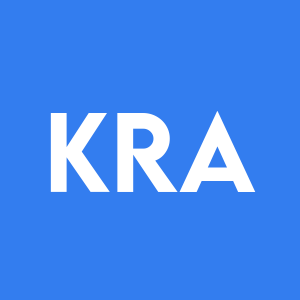KRATON COLLABORATES WITH SABIC TO DELIVER CERTIFIED RENEWABLE STYRENIC BLOCK COPOLYMERS IN EUROPE
Kraton Corporation (NYSE: KRA) partners with SABIC to produce ISCC PLUS Certified renewable Styrenic Block Copolymers at its Berre, France facility. The CirKular+ ReNew Series, featuring up to 70% renewable content, supports the circular economy, utilizing SABIC's renewable butadiene. This collaboration allows Kraton to reduce CO2 emissions by 4 kg per kg of butadiene produced compared to fossil alternatives, and lowers the carbon footprint of its products by up to 65%. The initiative reflects Kraton's commitment to the bioeconomy and sustainability in polymer production.
- Collaboration with SABIC enhances sustainability in polymer production.
- CirKular+ ReNew Series offers up to 70% certified renewable content.
- Significant reduction of CO2 emissions by 4 kg per kg of renewable butadiene.
- None.
Insights
Analyzing...
HOUSTON, March 14, 2022 /PRNewswire/ -- Kraton Corporation (NYSE: KRA), a leading global sustainable producer of specialty polymers and high-value biobased products derived from pine wood pulping co-products, is pleased to collaborate with SABIC, a globally diversified chemicals company, to produce ISCC PLUS Certified renewable Styrenic Block Copolymers (SBC) at Kraton's manufacturing facility in Berre, France.
The newly launched ISCC PLUS Certified renewable CirKular+™ ReNew Series expands Kraton's existing suite of solutions designed to advance the circular economy. With up to
SABIC's certified renewable butadiene is derived from animal-free and palm oil-free second-generation renewable feedstock, such as tall oil co-product from the wood pulping process in the paper industry, which is not in direct competition with human food and animal feed production sources.
According to the cradle-to-gate lifecycle assessment, from sourcing, the raw feedstock to producing the monomer, each kilogram of the company's certified renewable butadiene reduces CO2 emissions by an average of 4 kg compared to fossil-based virgin alternatives. Additionally, each ton of this butadiene also cuts fossil depletion by up to 80 percent.
"Kraton's ambition is to enable the bioeconomy and play a role in advancing the circular economy. Value chain collaboration is instrumental in achieving progress towards a circular economy. Kraton is excited to collaborate with SABIC in using certified renewable butadiene. It enables us to develop and produce Styrenic Block Copolymers with up to
Launched in 2020, the CirKular+ product line enables high-performance, innovative solutions for the circular economy and plastics upcycling using a holistic approach to product lifecycle. These products help customers shift to renewable materials, improve product performance, lower carbon footprint, and allow the uptake of recycled plastics.
Mohammed Al-Zahrani, Vice President, Chemical at SABIC, adds, "Sustainability in SABIC is embedded across our organization and goes hand in hand with our commitment to helping our customers and their customers meet their sustainability targets. Developing more sustainable solutions requires partnerships across the value chain. Our collaboration with Kraton for renewable butadiene as feedstock for Kraton's polymers is another example of working together towards our common goals and confirms the broad interest from the chemicals industry in developing sustainable solutions for the future. After SABIC's earlier successes in developing certified renewable and circular ethylene, propylene, and benzene, we are delighted to add certified renewable butadiene to our TRUCIRCLE portfolio."
SABIC's TRUCIRCLE portfolio spans a range of products and services, including design for recyclability, mechanically recycled products, certified circular products from feedstock recycling of used plastic, certified renewables products from bio-based feedstock and closed-loop initiatives to recycle plastic back into high quality applications and help prevent valuable used plastics from becoming waste.
International Sustainability and Carbon Certification (ISCC) PLUS certification is a globally recognized system that provides traceability of recycled and renewable-based materials across the supply chain and verifies that companies meet social and environmental standards.
About SABIC
SABIC is a global diversified chemicals company, headquartered in Riyadh, Saudi Arabia. It manufactures on a global scale in the Americas, Europe, Middle East and Asia Pacific, making distinctly different kinds of products: chemicals, commodity and high performance plastics, agri-nutrients and metals. SABIC supports its customers by identifying and developing opportunities in key end-use applications such as construction, medical devices, packaging, agri-nutrients, electrical and electronics, transportation and clean energy. SABIC recorded a net profit of SR 23 billion (US
About Kraton Corporation
Kraton Corporation (NYSE: KRA) is a leading global sustainable producer of specialty polymers and high-value biobased products derived from pine wood pulping co-products. Kraton's polymers are used in a wide range of applications, including adhesives, coatings, consumer and personal care products, sealants and lubricants, medical, packaging, automotive, paving and roofing applications. As the largest global provider in the pine chemicals industry, the company's pine-based specialty products are sold into adhesive, road and construction, and tire markets, and it produces and sells a broad range of performance chemicals into markets that include fuel additives, oilfield chemicals, coatings, metalworking fluids and lubricants, inks and mining. Kraton offers its products to a diverse customer base in numerous countries worldwide. Kraton and the Kraton logo are registered trademarks of Kraton Corporation, or its subsidiaries or affiliates, in one or more, but not all countries.
Media Contact: Mariam Ottun; T: (346) 435-8042
Investor Relations Contact: Gene Shiels; T: (281) 504-4886
![]() View original content to download multimedia:https://www.prnewswire.com/news-releases/kraton-collaborates-with-sabic-to-deliver-certified-renewable-styrenic-block-copolymers-in-europe-301501067.html
View original content to download multimedia:https://www.prnewswire.com/news-releases/kraton-collaborates-with-sabic-to-deliver-certified-renewable-styrenic-block-copolymers-in-europe-301501067.html
SOURCE Kraton Corporation








